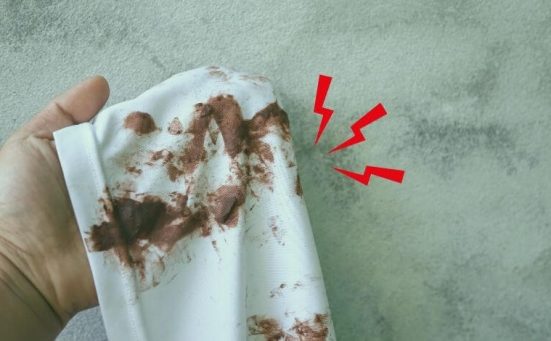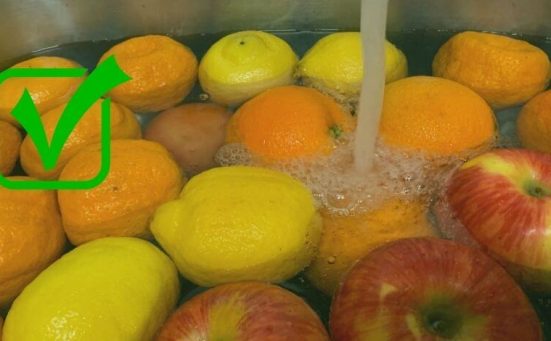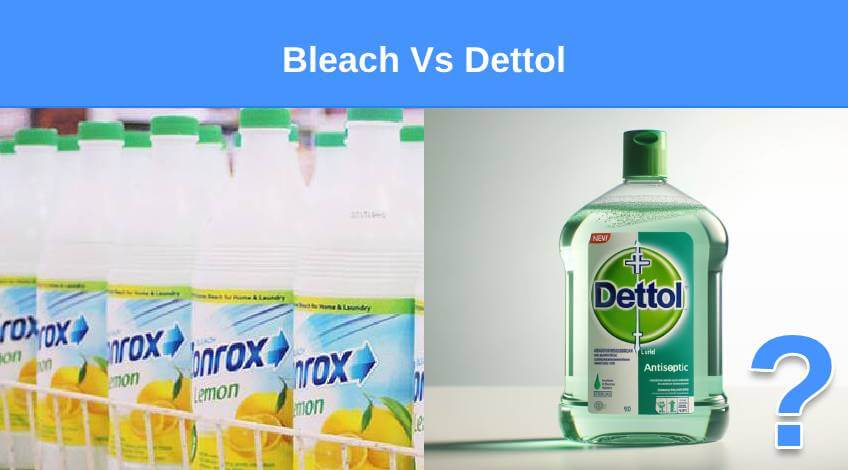
Bleach Vs Dettol (what’s the difference & when to use them)
Bleach and Dettol are both popular disinfectant cleaning products used in homes and public places. While they serve a similar purpose, they have their differences and are best used in separate situations.
Bleach is a strong chemical solution primarily made of sodium hypochlorite, that is best used for removing tough stains and grime. On the other hand, Dettol is a milder disinfectant that contains chloroxylenol and isopropyl alcohol. It’s gentler than bleach, suitable for a variety of surfaces, and can be used for skin disinfection.
Let’s have a closer look into their differences in this article, and also when’s best to use them.
Bleach And Dettol – Are They Really Different?
Bleach and Dettol are both disinfectants that many of us use in our homes. Before anything else, let’s understand what a disinfectant is:
A disinfectant is a chemical often used on various surfaces like walls and floors to kill and remove germs, bacteria, and fungi, including mould and mildew. Both bleach and Dettol are very popular disinfectant products in the UK.
Now that we’ve established the similarity between bleach and Dettol, here are their differences:
Comparing Bleach And Dettol
Here are the key differences between Bleach and Dettol:
- Bleach, primarily made of sodium hypochlorite, is more potent and suitable for heavy-duty disinfection.
- Dettol, containing chloroxylenol, is milder and used for a wider range of applications, including personal hygiene.
- Bleach can damage certain surfaces and fabrics, whereas Dettol is generally safer and less corrosive.
- Bleach is often used for sterilising medical equipment, while Dettol is commonly used for skin disinfection.
SAFETY TIP: When using either bleach or Dettol, it’s crucial to follow safety guidelines. Always wear gloves, ensure good ventilation, and never mix them with other cleaning agents, as this can produce toxic gases!
Bleach Or Dettol – Which One Should You Use?
To choose the better option depending on your needs, we need to understand the strengths and weaknesses of each disinfectant.
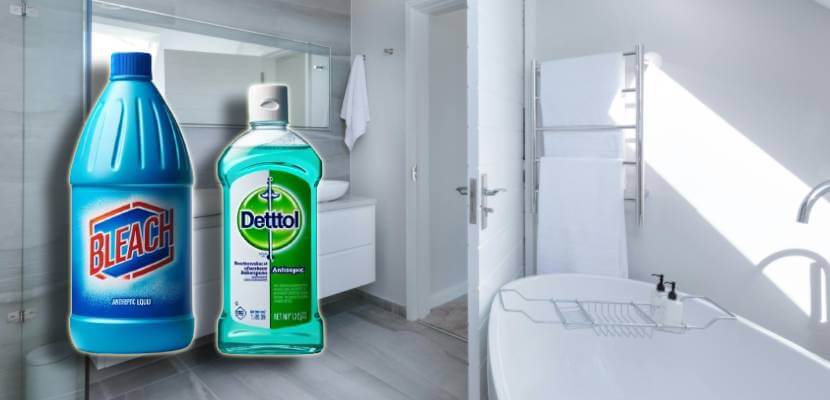
Here are the things you need to know about Bleach and Dettol:
What Is Bleach?
Bleach often comes in liquid form and contains sodium hypochlorite, a powerful disinfectant known to kill bacteria, viruses, and fungi.
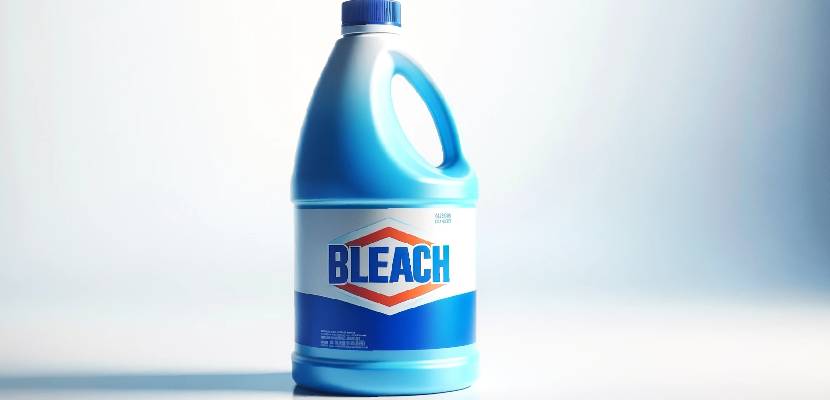
Due to its strong chemicals, it is often diluted with water to prevent surface damage. It is a common household product, valued for its effectiveness and affordability.
Advantages Of Bleach
- Bleach is highly effective against a wide range of microorganisms and is frequently used in hospitals and healthcare facilities.
- It is useful for whitening and removing stains from fabrics and surfaces.
- Bleach is cost-effective and widely available.
- It works quickly and can remove tough stains and mould that other disinfectants may struggle with.
Disadvantages Of Bleach
- Bleach has a short shelf life, losing disinfectant properties over time once opened.
- Its corrosive nature makes it unsuitable for porous materials like wood and granite.
- It can be harsh on skin and eyes and is toxic when inhaled.
- Mixing bleach with other disinfectants can create harmful gases.
When To Use Bleach
Bleach is ideal for disinfecting bathrooms, cleaning toilets, sinks, bathtubs, handling mould and mildew, whitening laundry, and sanitising kitchen surfaces.
- Domestos White & Sparkle Thick Bleach cleans and disinfects surfaces around your home
- Unstoppable in the battle against germs, Domestos bleach eliminates 99.99% of bacteria and viruses*
What Is Dettol?
Dettol is an antiseptic disinfectant usually containing chloroxylenol, used for cleaning and sterilising. It also often includes a mild version of isopropyl alcohol, making it effective in killing germs on surfaces.
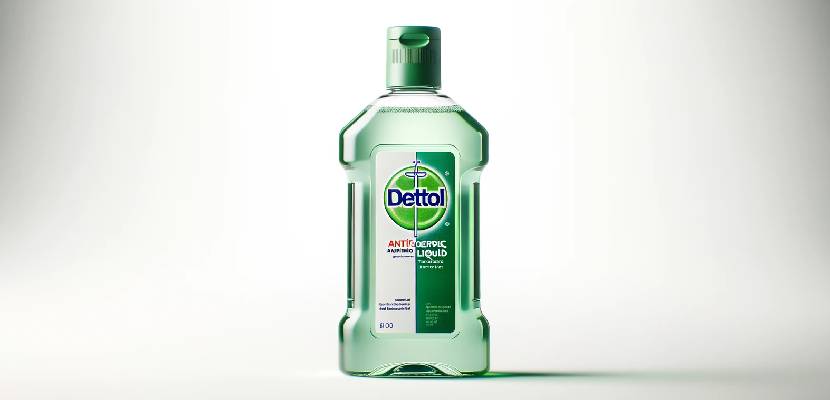
Dettol is gentler than bleach, suitable for various surfaces, and can even be used to disinfect skin and wounds when diluted.
Advantages Of Dettol
- Dettol has antiseptic properties effective against bacteria and some viruses.
- It is milder, less corrosive, and safer for a variety of surfaces and fabrics.
- Dettol can disinfect fabrics without causing bleaching or damage.
- It has a more pleasant smell and a longer shelf life, retaining effectiveness over time.
Disadvantages Of Dettol
- Dettol is not as effective as bleach in killing germs, bacteria, and fungi.
- It requires more product, time, and effort to remove tough stains and clean dirty spaces.
- Careful handling and storage are necessary to prevent harm to children and pets.
When To Use Dettol
Dettol is best for personal hygiene, household cleaning, disinfecting floors, tiles, countertops, sanitising clothes, and treating cuts and scrapes on the skin.
- For first aid, medical and personal hygiene uses
- Effective concentrated antiseptic solution that kills bacteria and protects against the germs
Choosing The Right Disinfectant For Your Needs
Whether to use bleach or Dettol depends on the situation!
For tough grime, bleach is your go-to choice. For a multi-purpose product for various areas in your home, Dettol is the better option!
Understanding their differences and proper applications ensures effective and safe cleaning.
Do you have questions? Feel free to ask below!
SEE ALSO: Bleach Vs Toilet Cleaner (what’s the difference & when to use them)
Frequently Asked Questions
No, Dettol is not the same as bleach. While both are disinfectants, bleach is a strong chemical solution primarily made of sodium hypochlorite, ideal for heavy-duty disinfection. In contrast, Dettol is milder, containing chloroxylenol and isopropyl alcohol, and is more suitable for a variety of surfaces and personal hygiene.
Whether a disinfectant is better than bleach depends on the usage. For tough grime and heavy-duty disinfection, bleach is more effective. However, for general household cleaning and personal hygiene, a milder disinfectant like Dettol is safer and more suitable.
While bleach is highly effective against a wide range of microorganisms, its harsh nature can be a drawback. Alternatives that work better in certain situations include hydrogen peroxide, which is less corrosive, and alcohol-based disinfectants, which are more suitable for skin disinfection.
Yes, bleach can be harmful to the skin. It is corrosive and can cause irritation, burns, or damage to the skin, especially in its undiluted form. It’s important to handle bleach with care, use protective gloves, and avoid direct skin contact.
It’s crucial not to mix bleach with other cleaning agents, especially ammonia, vinegar, or alcohol, as this can produce toxic gases. Mixing bleach with other disinfectants can be dangerous and should be avoided to ensure safety.
Also, follow us on Pinterest ...




